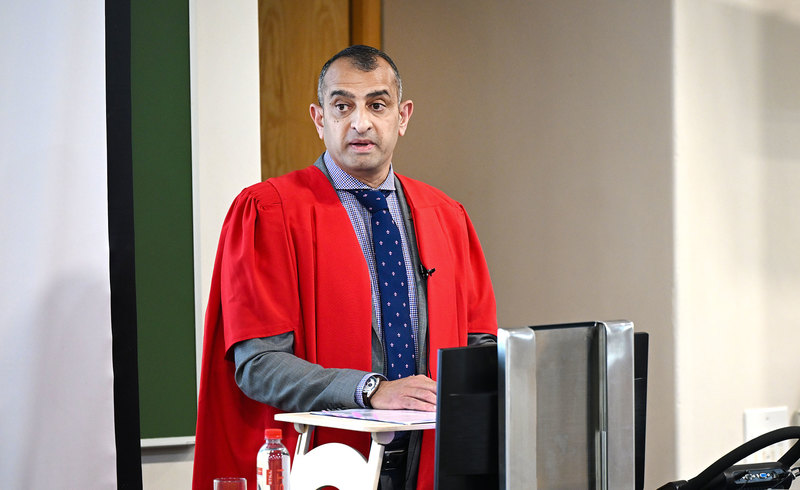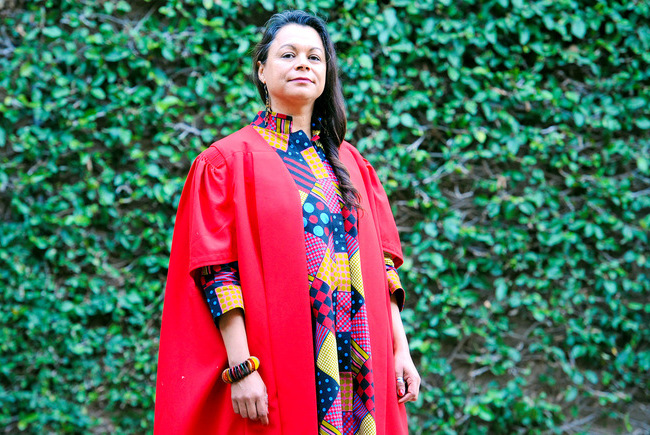The South African civil justice system: Transformative steps to bridge the gap
09 May 2024 | Story Lyndon Julius. Photos Lerato Maduna. Read time 6 min.
Professor Mohamed Paleker’s inaugural lecture, titled “The 'One-Shotter'–'Repeat-Player' dichotomy in the South African civil justice system: Transformative steps to bridge the gap”, was held in the Kramer Law Building. It was attended by his students – past and present – peers, and colleagues.
The event featured three distinguished speakers, including Deputy Vice-Chancellor for Teaching and Learning Emerita Professor Linda Ronnie; the dean of the Faculty of Law, Professor Danwood Chirwa; Professor PJ Schwikkard from the Department of Public Law; and Deputy Vice-Chancellor for Transformation, Student Affairs and Social Responsiveness, Professor Elelwani Ramugondo.
“Inaugural lectures mark the ascent to full professorship, the highest academic rank. It provides universities with an opportunity to celebrate the achievements of the academics,” Emerita Professor Ronnie said. “They also, importantly, provide an opportunity for the inaugural lecturer to share his or her insights into their scholarly work in a manner that is accessible to us, the broader audience.”
A stroll in the jungles of Fiji
Professor Paleker reflected on a conference he once attended in Fiji as he got his lecture under way. It was there that he came across a 1974 article written by Marc Galanter titled: “Why the ‘Haves’ Come Out Ahead: Speculations on the Limits of Legal Change”. This article piqued his interest and helped shape his narrative for his research. It was in Galanter’s article that Paleker came across the terms ‘One-Shotter’ and ‘Repeat-Player’.
“My focus is on the theoretical aspects governing civil justice, as this is the only aspect that I have the power to influence. I dedicate my time to pondering and contemplating civil justice while working on the theory to enhance it. Occasionally I step out of my comfort zone and venture into the practical field to improve the theory; improving the theory can enhance the practice positively impacting people’s lives.”
Paleker continued: “Incidentally, I found out about this particular article while walking in a rainforest in Fiji with a judge of the federal court of Germany. The article made a lasting impression, shifting my perspective on civil justice, the civil justice system, and how we theorise the civil justice system.”
The lecture continued as Paleker unpacked the significant eventuality between the ‘One-Shotter’ and the ‘Repeat-Player’ and how these litigate differently within the South African court system.
“Repeat-Players are better equipped to manage the emotional aspects of litigation based on previous experiences, having the benefits of foresight and hindsight assist in quelling the anxiety associated with litigation. A major advantage of ‘Repeat-Players’ [over the ‘One-Shotter’] is the access to greater financial resources.”
The term “One-Shotter” refers to a party involved in a legal dispute who would typically engage in litigation only once or infrequently, oftentimes lacking in extensive resources while facing higher risks relative to their opponents. On the other hand, a “Repeat-Player” is a party who frequently engages in litigation, often possessing significant resources and enjoying lower relative risks.
Balancing the scales
The imbalance that exists between those who identify as ‘One-Shotters’ versus those who are seen as ‘Repeat-Players’ within the litigation process is evident following the points made clear by Paleker.
“The fact that most cases involved ‘One-Shotter’ settle on the doorsteps of the court is no coincidence. Therefore, ‘One-Shotter’ experienced inherent disadvantages that cannot be fully satisfied even with the provision of legal services. So why is all of this important? It’s important because of the following.
The distinction between “One-Shotter” and “Repeat-Player” in litigation is significant for these reasons:
- Firstly, it helps identify who uses the courts and for what types of matters.
- Secondly, it highlights the power imbalances in litigation between different litigants. Classifying litigants into a ‘One-Shotter’ or ‘Repeat-Player’ [category] allows us to comprehend the reasons behind this imbalance.
- Finally, such knowledge can assist us in critically engaging with the litigation system to determine its fairness.
In essence, the distinction creates a new perspective to evaluate South African civil procedure – its strengths and weaknesses.
 This work is licensed under a Creative Commons Attribution-NoDerivatives 4.0 International License.
This work is licensed under a Creative Commons Attribution-NoDerivatives 4.0 International License.
Please view the republishing articles page for more information.
The UCT Inaugural Lecture Series
Inaugural lectures are a central part of university academic life. These events are held to commemorate the inaugural lecturer’s appointment to full professorship. They provide a platform for the academic to present the body of research that they have been focusing on during their career, while also giving UCT the opportunity to showcase its academics and share its research with members of the wider university community and the general public in an accessible way.
In April 2023, Interim Vice-Chancellor Emeritus Professor Daya Reddy announced that the Vice-Chancellor’s Inaugural Lecture Series would be held in abeyance in the coming months, to accommodate a resumption of inaugural lectures under a reconfigured UCT Inaugural Lecture Series – where the UCT extended executive has resolved that for the foreseeable future, all inaugural lectures will be resumed at faculty level.
Recent executive communications
2025
2024

Professor Susan Cleary delivered her inaugural lecture on 14 March.
14 Mar 2024 - 5 min read2023

Prof Lydia Cairncross’s inaugural lecture provided a snapshot of the career path of a surgeon and community activist whose commitment to social justice means her work doesn’t end in the operating theatre.
02 Nov 2023 - 8 min read2022

Professor Linda Ronnie is in UCT’s Faculty of Commerce.
28 Sep 2022 - 6 min read2021
2020
2019
2018
2017
2016 and 2015
No inaugural lectures took place during 2015 and 2016.































































.jpg)


















